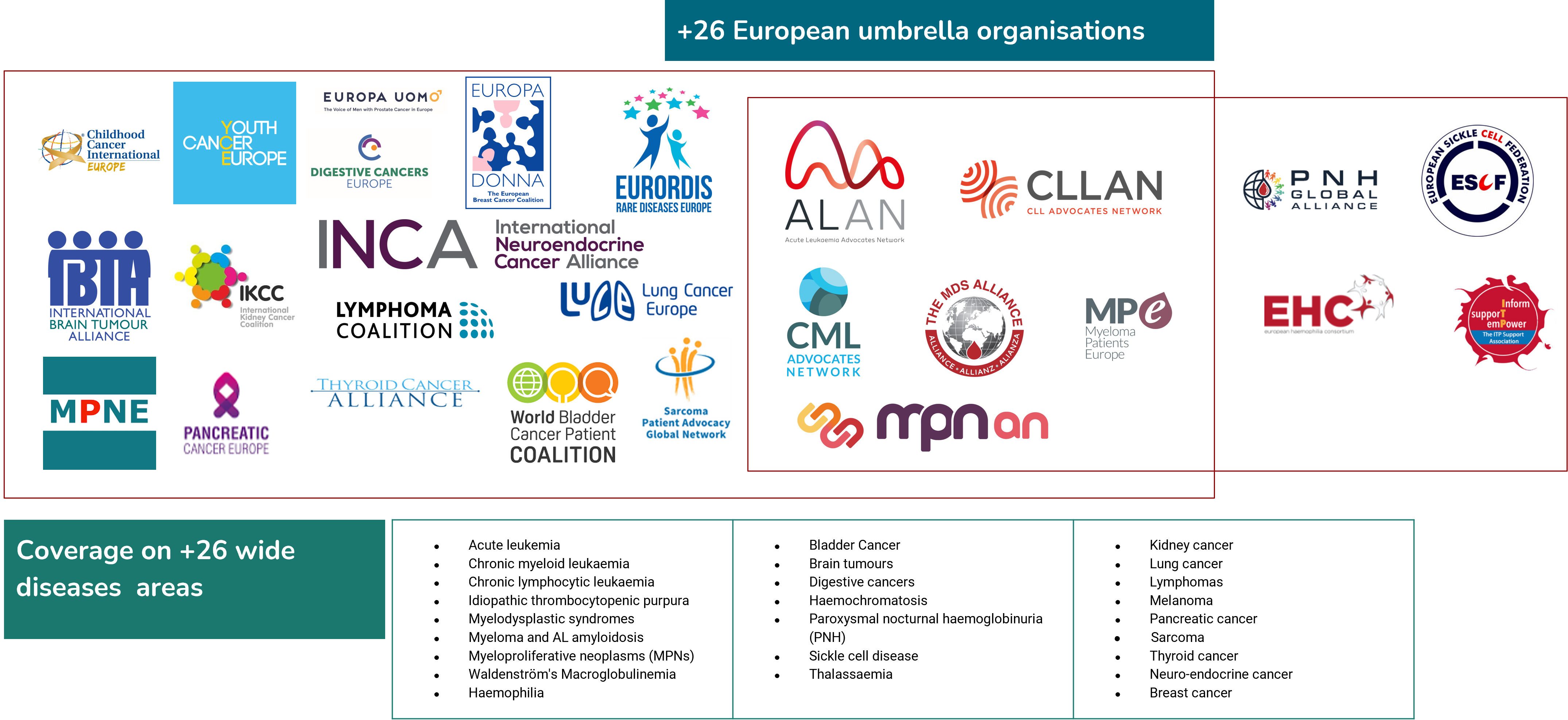Research
European Atlas on Clinical Trials in Cancer and Hematology
European Atlas on Clinical Trials in Cancer and Hematology or EuroACT is a research project initiated by WECAN and the European Hematology Community. The project aims to understand the clinical trial landscape in the European region, based on data extracted from all relevant European clinical trial registers. Data from the past five years will unveil differences where clinical trials have been run in European countries and will describe how and which patient-reported outcomes (PROs) and quality-of-life (QoL) instruments have been used in clinical trials.
Results from EuroACT will guide the understanding of inequalities and differences in the availability of clinical trial sites across European counties, and provide evidence on the use of relevant QoL instruments in clinical trials. It will inform patient advocacy organisations, researchers, and policymakers to make future clinical trials more accessible and more relevant to patients.

UNDERSTANDING THE CLINICAL TRIAL LANDSCAPE
EuroACT builds upon a research project initiated by Myeloma Patients Europe where data on clinical trials and QoL instruments over a period of 20 years was collected. The data gathered focused on myeloma in Eastern countries of Europe.
To be able to compare across disease areas, identify gaps, and overcome challenges, more evidence is needed. EuroACT expands the scope of the project to 26 diseases areas in the WHO European Region over a period of five years.
Hypothesis: Most clinical trials are run in a few European countries and some countries are neglected
Access to clinical trials is a topic that features highly on the agenda of most European patient organisations, particularly those advocating on behalf of patients with cancer, haematologic, and rare diseases. Patient access to trials is hugely important. Clinical trials provide the option to access new and emerging therapies which can present additional options for survival, preventing, delaying, or reversing disease progression, and improving or maintaining quality of life. In addition, access to trials within a patient’s country of residence improves the likelihood of the studied medicine or therapy becoming available to patients within that country.
Often, patient organisations will engage in dialogue with pharmaceutical companies to attempt to understand and address the issue around inequities in access. Patient organisations frequently report frustrations in their efforts, particularly when asking pharma to address the question of access in Central and Eastern Europe, or outside of the “Big 5” economies (France, Germany, Italy, Spain and the UK).
Data gathered by this project will provide the evidence of the clinical trial landscape in Europe. With this evidence, patient organisations can engage in more meaningful conversations with stakeholders on challenges, patterns, and opportunities for improving access to clinical trials.
Hypothesis: Many clinical trials are conducted with meaningless or no Patient-Reported Outcome Measures (PROMs) e.g., Health-Related Quality of Life (HRQoL).
When considering the issue of quality of clinical trials, patient organisations also raise concerns about the tools used to measure PRO / HRQoL in trials where collection of data takes place. An increasing number of validated generic, symptom-specific and disease-specific measures for PRO / HRQoL exist, but they are not used consistently or in a meaningful way. Patient organisations are keen to gather data on understanding not only whether PRO / HRQoL tools are used in studies, but which of those tools are utilised in clinical trials to advocate for utilisation of the tools considered meaningful for PRO / HRQoL measurement and make recommendations for best practice around PRO / HRQoL tools utilised within respective disease areas in clinical trials.
Project Overview
Supporters
EuroACT is hosted by the European Patient Advocacy Institute gUG on behalf of WECAN. Funding was obtained from the following funders. Supporters had no role in the development of this project



